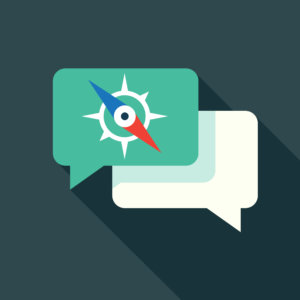Ethics as Conversation: A Process for Progress


Topics
Column
Most organizations can agree on what questions to consider before making a decision about marketing, finance, or operations. But many stumble when the issue at hand has ethical outcomes.
One former CEO of a large financial services company put it this way in a recent conversation: “By the time the issue gets to me, it’s been analyzed, scrubbed, and PowerPointed to where I don’t have much idea what really might have happened. But I still have to make a decision that has ethical consequences.” He said this meant he had to be confident that people in his organization had posed roughly the same questions he would ask. He wasn’t so sure that was the case.
We began to use this insight in our conversations with executives and students. We ask them to define what we call “your ethics framework.” Practically, this means defining what set of questions you want to be sure you ask when confronted with a decision or issue that has ethical implications.
The point of asking these questions is partly to anticipate how others might evaluate and interpret your choices and therefore to take those criteria into account as you devise a plan. The questions also help leaders formulate the problem or opportunity in a more nuanced way, which leads to more effective action. You are less likely to be blindsided by negative reactions if you have fully considered a problem.
The exact questions to pose may differ by company, depending on its purpose, its business model, or its more fundamental values. Nonetheless, we suggest seven basic queries that leaders should use to make better decisions on tough issues.
How does this make me feel? One of the hallmarks of tough ethical issues is that they have an emotional basis as well as a factual one. Your stakeholders will not necessarily evaluate your choices rationally, particularly if they are affected negatively. Attending to your own emotions is one way to anticipate stakeholder responses. Of course, this question presupposes a fairly careful analysis of the facts and circumstances, but if we do not try to get a handle on the emotional part of an ethics problem, we run the risk of just intellectualizing it. We need to get better at listening to our feelings as well as doing a hard-nosed analysis of facts, constraints, and contexts.
Get Updates on Innovative Strategy
The latest insights on strategy and execution in the workplace, delivered to your inbox once a month.
Please enter a valid email address
Thank you for signing up
Who is affected and how? Every person is enmeshed in a complex array of relationships with others who can be harmed or benefited by their choices. Likewise, organizations have a set of stakeholders with whom they are trying to create value. Knowing how a particular ethical issue affects these relationships is crucial for good decision-making. In addition, some of these stakeholders — both personal and organizational — may well have legitimate claims that must be respected. Tough analysis of these “who” and “how” questions are prerequisites for effective action.
Who can I talk to about this issue? We learn ethical values and principles through our conversations with family, friends, and others. When we find ourselves involved in a situation with ethical consequences, it is a good idea to reach out to confidants to talk about what we should do. Sometimes, reasons of confidentiality (itself an ethical concept) preclude sharing the specifics of a problem, but in most cases, we can still get useful advice from those who won’t simply tell us what we want to hear.
Are there alternative framings of the issue that I should explore? Once a decision is framed to be about a certain issue, making the decision itself is often fairly easy. As American philosopher John Dewey noted, “…a problem well put is half-solved.” However, framing the issue is usually the most difficult part of the process. If an executive frames an issue only in terms of “what is best for shareholders,” the answer she reaches may be fundamentally different than if she had framed it as “what is best for stakeholders.”
What are my best options? Thinking about framing leads to considering new ways to approach an issue, especially the timing of different alternatives and their associated actions. Considering different choices is critical for effective action because each has its own set of strengths and weaknesses. When decision makers rely on only a single idea, they are more likely to be blind to its weaknesses. Having multiple possibilities for addressing an issue increases learning as you compare and contrast their consequences. Managers may also feel pressure to make trade-offs among stakeholders when they don’t see routes to satisfy multiple groups. In dealing with complex stakeholder issues, options also need to be tested and refined with stakeholders’ input.
What would happen if my thinking and decision became public? Ethics is deeply personal, but it is also deeply social. Many people respond to criticism of their ethics by saying, “I have to look at myself in the mirror. I have to live with myself.” That is, of course, correct. But your organization also has to live with you and your choices. Ethical decision-making must pass some kind of publicity test. What would happen to your organization if your decisions were on the front page of the newspaper? Would you still be proud to tell your children or other loved ones what you did?
What would cause me to change my mind and my decision? We often think that once we make a decision, the issue is closed. But a key feature of ethical choices is that this is rarely the case. We need to continuously monitor circumstances to be able to decide whether our decision needs to be modified. This is especially true with the deployment of new technologies: As the use of a particular technology emerges and we learn more about its consequences, we need to be ready to modify our course. The attitude of humility that this question fosters is essential for continued learning and adaptation.
Unethical behavior is harder to hide thanks to the explosion of social media. Leaders who want to embed ethics into how their businesses operate need to articulate and practice using questions that foster continuous conversation about what their organizations do and how they can do it better.
Whatever your ethics framework and whatever set of questions you bring to addressing ethical decisions, we encourage you to continuously think through them. That will help you hone and improve them so that you and your organization can make even more effective choices.

